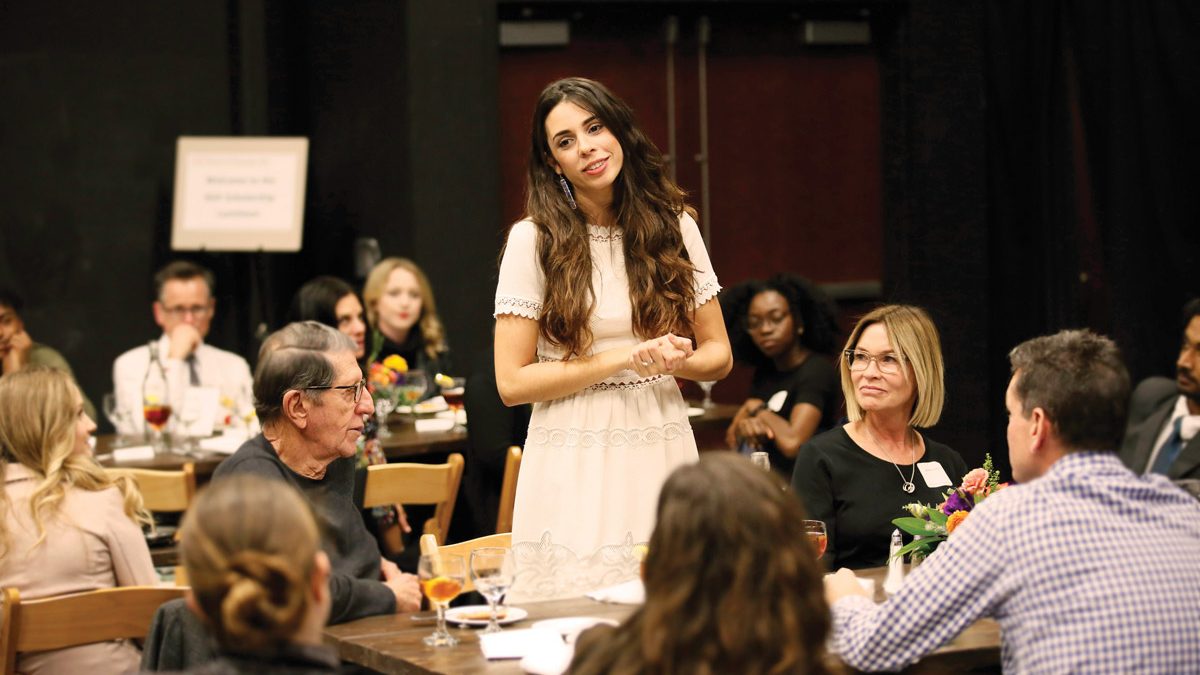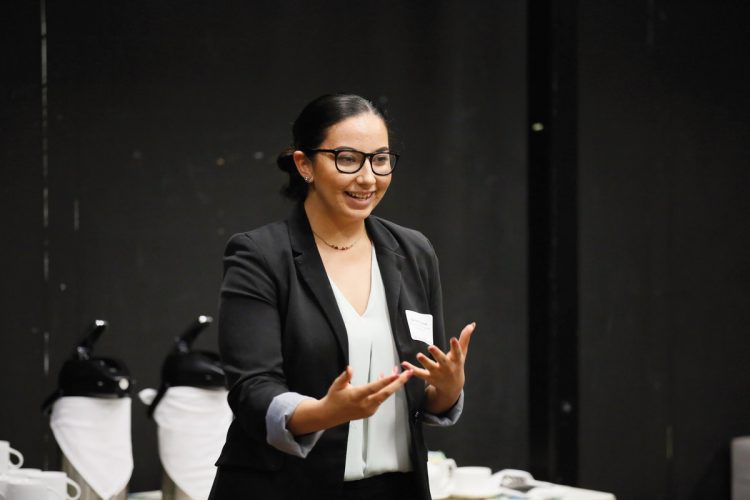
Natalia Leyva Lezcano at the 2018 SDA Scholarship Luncheon
As an undergraduate theatre major, Natalia Leyva Lezcano struggled daily with financial uncertainty.
“I didn’t have a car and I had to work outside of school, so I always had to try to find transportation to get there. My first year, I missed a bunch of classes because I had to work, or I’d go to my classes and then I didn’t have the money to pay the rent. It was very difficult,” she confides.
After earning her BFA at the University of Puerto Rico, Rio Piedras Campus, Leyva Lezcano applied to the USC School of Dramatic Arts MFA program, determined to continue her training as an actor, even if it meant drowning in student loan debt.
When her letter of acceptance arrived, Leyva Lezcano was overwhelmed to learn that she had been awarded the Anderle Family Endowed Memorial Scholarship. “I read the letter three times,” she says. “My reaction was, ‘really, why me?’ I’m coming here to L.A. from Puerto Rico and you don’t even know me.” When she met some of the SDA scholarship sponsors at an informal welcome luncheon, “it was like meeting family.”
“To be honest,” she adds, momentarily fighting tears, “I had never felt that kind of support in my life. For the first time, I didn’t have to worry about how I would pay the rent or get a costume or buy books for school. I was able to fully concentrate on my studies and the program.” That security gave Leyva Lezcano the freedom to explore her art in ways she didn’t expect.
“Theatre is a beautiful way to show human relationships, that this is what human beings are,” she observes. “And I’ve learned so much about myself. I want to be able to share my art and keep acting, and as a Latin woman, I want to represent my country, especially with all that’s happening now.”
Steve Nagelberg and Jerri Nagelberg, members of the SDA Dean’s Circle, and lead donors to the SDA Scholarship Fund, wrote in a joint statement, “We are always moved by the stories we hear and the impact that the dramatic arts is making on students’ lives. We enjoy knowing that our financial support is not only helping the School of Dramatic Arts secure the best talent, but that it is also reducing students’ financial burden so they can fully focus on their training at USC and position themselves for the greatest success in the field.”
Alejandra Villanueva, a sophomore in the SDA BFA program, was born in San Diego, but spent most of the first years of her life in Mexico. When her family moved back to San Diego, Villanueva spoke “zero English, so I was a few steps behind in school and that was a huge challenge.” Battling depression in middle school, Villanueva found refuge in pursuing theatre.
“I had a drama teacher with her own nonprofit theatre group, where we would go to low income communities to do plays for kids,” she recalls. Her depression lifted and in high school, Villanueva participated in theatre- and creative arts-based projects in a variety of ways, from acting to writing scripts and stage-managing. “I would take every opportunity offered.”
Villanueva applied to the SDA BFA program and learned that her acceptance came with a generous scholarship. The impact of this financial support has been profound, she says.
“… people believed enough in me to invest in me and my dream of being in the performing arts, [which] has truly helped me be confident in what I’m studying. It sometimes brings me to tears that people willingly help me and support me in that way, and it has kept inspiring me.”
When she felt “shaky” freshman year, Villanueva says, “it gave me that little push that says ‘you can’t drop out now’ because these people believe in you. It’s truly a blessing that there are people out there willing to help someone from my community, to give kids the opportunity to fulfill their dreams. I’m so grateful.”
Building the School’s scholarship fund is a key priority so that we can offer more merit-based scholarships to future incoming students. For more information about supporting the School of Dramatic Art’s scholarship fund, please email Kim Muhlbach, associate director of development, at muhlbach@usc.edu or 213 821 4045.
Story appeared in the 2018-19 Callboard magazine.
